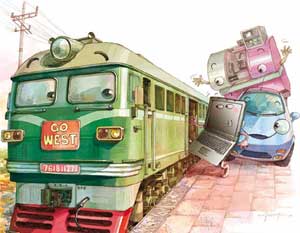Driving forces on the road
Updated: 2011-10-23 08:36
(China Daily)
|
|||||||||
North Taxi Company officer Hu Xuesong tells China Daily the bureau's policies aim to ensure more than 95 percent of the capital's 66,600 cabs are operating at all times.
"We will dispatch more taxis to important locations before special events and will develop specific plans to ensure there are enough cabs on duty if the weather forecast calls for rain or snow," Hu says.
He says his company has received few complaints, but claims that more than 90 percent of calls are from customers hoping to retrieve lost items they left in the vehicles.
Without much prospects on the road on Mid-Autumn Festival morning, Sun decides to clock out early to enjoy a holiday dinner with his family in Yanqing, 74 kilometers from downtown Beijing.
"Usually, public holidays are like any other day for me, except I earn less," he says.
"Of course I can rest anytime I like, but I'll lose money."
The meter on what he owes the taxi company never stops, he says, "so I almost never see my wife and son".
His wife, Xie Shangqin, appreciates the work Sun does to support them.
"He looks run-down and sleepy every time I see him," she says. "His work is so tough. But because he only has a junior middle school education, he has no choice. I keep family problems from him. I don't want him to worry while he's driving around."
It was for his family that Sun took the job. The tuition fees for his son, a middle-school second-grader, are 100 yuan an hour.
In the three months since China Daily first spoke to him, Sun's outlook has changed.
He had said then he was proud of his familiarity with the city.
"A simple 'thanks' from passengers makes all my hardships worthwhile," he also said. But a few months and too many long hours later, he says: "Chronic pain in my waist and buttocks has killed my passion. I'm numb to passengers' gratitude."
He has lost 10 kilograms in his first three months and started suffering pains and aches in the first few weeks.
"My mother says the first two months as a cabbie added two years to my age," he says. His wife says she hopes he can quit when their son enters university.
"All of the cabbies are driving around totally exhausted," Sun says. "The companies tell us we should mix work with rest. But that's impossible."
The main cause is the hefty rental charges that have Sun on the road far longer than is healthy or safe. The government is paying cab drivers a small subsidy, but it is not enough.
Drivers in Zhejiang's provincial capital Hangzhou won lower rental fees after a three-day strike in August.
Shanghai also lowered the fees in May.
Hu, the Beijing company officer, says there are no plans to lower fees in the capital. Sun believes paying a little more than 2,000 yuan would be more reasonable.
"I hope the government will adopt some measures to relieve our pressure," he says. "That way, we may even get to rest occasionally."










